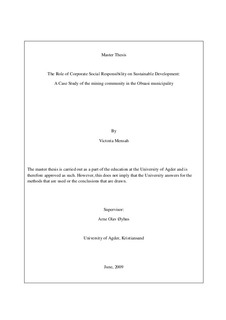| dc.description.abstract | The thesis explores and explains Corporate Social Responsibility (CSR) and its impact on
the sustainable development of people living in a gold mining community, Obuasi in the
Ashanti region of Ghana. Through observations, document analysis and conduction of
interviews of the local citizens, it seeks to assess the impact of gold mining operations on
various aspects of the lives of the local people. Usually described the gateway to Africa,
Ghana is known as a peaceful and democratic country in the sub region with fairly strong
economic indicators (CIA, 2009). Generally described as the oldest surviving mines in
the country, the Obuasi mine is over a century old and is still counting, having gone
through various phases and methods of gold mining
Various theorists and institutions, including international institutions such as the IFC, and
DFID have defined sustainable development in their own context but in this thesis, the
definition of sustainable development is drawn from the Rio conference; Our Common
Future which defines sustainable development as “development that meets the needs of
the present without compromising the ability of future generations to meet their own
needs” (Brundtland, 1987: 43). In another way, it could be defined as development that
conserves and protects our resources. An interesting way of testing this definition is the
case study of a natural resource rich (specifically gold) community.
The virtue of Corporate Social Responsibility (CSR) as the voluntary incorporation of
social and environmental concerns into business conduct has established itself as an
international norm. Businesses, intellectuals, local and international development
agencies like the USAID have embraced this concept with the hope that it could bring
about sustainable development to developing countries. Although the company mining
the Obuasi mine - AngloGold Ashanti (AGA) seems to uphold the concept of social
responsibility, their willingness and zeal to ensure the reality of such policies are almost
non-existent. CSR is best practiced when done in partnership with the local community,
but in the case of AGA, the formulation and implementation of the policies are done by
the company with very little consultation with the people. Nonetheless, it expects the
community to accept their stretched hand of philanthropy as a favour from them and not
complain about the economic, cultural, social and environmental hazards that they have
to endure as a result of the operations of the mine. Being a signatory to the Global
Compact agreement and the ISO 14001, the company has tried to consistently improve
their social commitment but they still have a very long way to go, if we want to see
sustainable development in the Obuasi municipality as defined by the Rio conference. | en |
